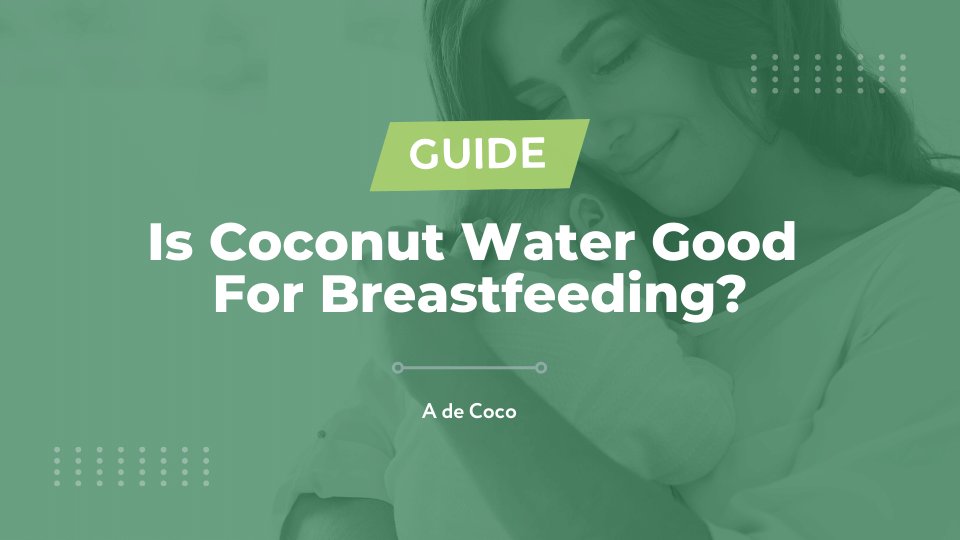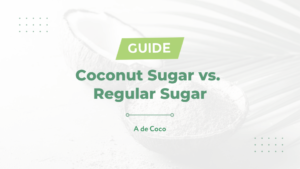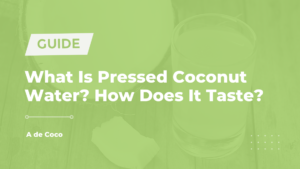Nourishing the mother’s body is crucial during the postpartum period, especially when she is nursing.
What she consumes will directly impact her milk production and, by extension, the baby’s health.
Amongst various diet options, one tropical drink that often raises questions is coconut water.
Its popularity has grown globally owing to its various health benefits.
However, doubts arise when talking about its consumption during breastfeeding.
This article will delve deeper into the scientific evidence surrounding this topic and attempt to clear the fog of uncertainty.
Contents
- Is Coconut Water Good For Breastfeeding?
- Understanding Coconut Water and Its Nutritional Profile
- Effect of Coconut Water on Hydration Levels
- Importance of Hydration for Breastfeeding Mothers
- Coconut Water’s Role in Boosting Milk Production
- Comparing Coconut Water with Other Hydrating Drinks
- Potential Side Effects of Coconut Water Consumption During Nursing
- How Much Coconut Water Can A Breastfeeding Mother Consume Daily?
- Can Coconut Water Replace Water in a Nursing Mom’s Diet?
- Ways to Incorporate Coconut Water in a Nursing Mother’s Diet
- The Bottom Line
Is Coconut Water Good For Breastfeeding?
Yes, coconut water is beneficial for breastfeeding mothers. It is known to contain essential electrolytes, vitamins, and minerals that can prevent dehydration and help in maintaining optimal bodily functions. Further, it can also boost milk production, but it is advisable that nursing mothers consult healthcare professionals before including it in their diet.
Moving beyond the singular focus on coconut water as a beneficial drink for breastfeeding mothers, it’s essential to delve into the broader subject of nutrition during this critical period.
We will unpack the vital role that a well-balanced diet plays for breastfeeding mothers, the importance of adequate hydration, and explore other nutrient-rich foods and drinks that can complement the benefits of coconut water in a lactating mother’s diet.
Also, there’s an important discussion to be had about the precautions and consultative practices one should follow before making significant dietary changes, especially while nursing.
Rest assured, this multifaceted exploration offers invaluable insights for breastfeeding mothers who are keen on optimizing their nutrition for their well-being and that of their child.
In this in-depth discourse, expect an exploration of the science-backed benefits of coconut water and other dietary recommendations, practical tips, considerations, benefits, and potential risks that every breastfeeding mom should know about.
Let’s explore these components further.
Understanding Coconut Water and Its Nutritional Profile
Coconut water is a tropical delight filled with a plethora of nutrients vital for the human body.
Primarily constituted of water, it’s low in calories making it a guilt-free, hydrating beverage.
Moreover, it holds significant quantities of minerals such as potassium, magnesium, and calcium, all instrumental in regulating body functions.
Nature’s Own Electrolyte
Among the fantastic properties of coconut water is its high electrolyte concentration.
These electrolytes are essential for maintaining hydration levels, especially during physical exercise or weather extremes.
Coconut water naturally contains high levels of electrolytes.
Indeed, this natural drink has often been labeled as nature’s sports drink due to these properties.
Drinking coconut water replenishes these essential minerals, avoiding imbalances that could potentially harm overall health.
Antioxidant-Rich and Benefits for Digestion
Antioxidants found in coconut water combat oxidative stress caused by an overflow of free radicals in the body.
This combating mechanism can prevent cellular damage, reducing the risk of various diseases.
What’s more, it also contains fiber, albeit not in massive quantities, which can contribute to healthy digestion.
Such a nutritional profile makes coconut water a beneficial addition to any diet, under appropriate circumstances.
Due to the fiber content in coconut water, it aids in digestion.
The nutritional profile of coconut water showcases its versatility as a refreshing drink that also provides essential nutrients.
Being aware of these attributes can help when it comes to making informed dietary choices.
If you’re interested in digging deeper into this subject, the linked video provides more detailed information. In particular, it magnifies the numerous health advantages of incorporating this tropical powerhouse into your routine.
Effect of Coconut Water on Hydration Levels
It’s common knowledge that staying hydrated is crucial for overall health, and that’s particularly true for breastfeeding mothers.
This importance of hydration brings us to explore the potential of coconut water as a hydrating drink.
Coconut Water as a Natural Hydrator
One of the notable features of coconut water is its natural hydrating abilities.
This refreshing drink derived from the endosperm of green coconuts is rich in electrolytes like potassium, sodium, and magnesium.
These are vital minerals that help maintain balance of water in our body and promote hydration.
Coconut water is known to have an isotonic composition, which means it could replenish lost fluids in the body quickly.
Coconut water is known to have an isotonic composition, which means it could replenish lost fluids in the body quickly.
It makes sense when you consider that it’s nature’s very own sports drink, having been a traditional go-to refreshment and hydrating drink in tropical regions for centuries.
This backs its reputation as a natural hydrator, potentially proving to be more beneficial than some of the other fluids we consume for hydration.
Coconut Water vs. Plain Water for Hydration
When we think of hydration, the first thing that probably comes to mind is plain water.
Regular water intake is vital for hydration, but does coconut water have an edge over it?
In some ways, yes. Coconut water not only helps replenish fluids, but it also supplies the body with essential electrolytes which plain water doesn’t.
These electrolytes are critical for optimal cellular function and maintaining our body’s fluid balance.
“Coconut water not only helps replenish fluids, but it also supplies the body with essential electrolytes which plain water doesn’t.”
This aspect gives coconut water a slight advantage over normal water for hydration, especially in situations where there’s excessive fluid loss through sweat.
However, it’s essential to underline that while this tropical drink can complement your hydration efforts, it should not replace regular water intake.
Every individual’s hydration needs may differ based on factors like body weight, physical activity level, and health status.
Thus, breastfeeding mothers should listen to their body’s cues for thirst and fulfill their specific hydration needs, rather than sticking to a blanket prescription.
Importance of Hydration for Breastfeeding Mothers
Hydration plays a significant role for breastfeeding mothers on many levels. While breastfeeding, the body uses up more fluid than usual to produce breast milk. This is why staying hydrated is extremely important in ensuring the well-being of both mother and her baby.
Moreover, adequate hydration helps maintain healthy milk production. This helps support the nutritional needs of the nursing infant while also preserving the mother’s health.
Interconnection between Maternal Hydration and Milk Volume
To highlight the central connection, maternal hydration directly influences milk volume. A mother’s body puts high priority on making milk, consequently the amount of water she drinks can impact the quantity of breast milk produced.
Interestingly, a dehydrated mother could still produce milk. However, chronic dehydration could cause a drop in milk supply. Therefore, sufficient fluid intake is advised to maintain healthy breast milk supply.
A mother’s body puts high priority on making milk, consequently the amount of water she drinks can impact the quantity of breast milk produced.
This statement reflects the crucial role hydration plays in breastfeeding. It highlights the importance of drinking enough fluids, particularly water, as it is instrumental for optimal milk production.
Furthermore, hydration affects a nursing mother’s overall health. Proper hydration helps replenish fluids lost during breastfeeding and counteracts effects of dehydration such as fatigue and confusion. This is crucial as it foster mother’s ability to care for herself and her infant.
Recognizing Dehydration Signs in Breastfeeding Mothers
Let’s delve into how to identify signs of dehydration in nursing mothers. Some common indicators include dark yellow urine, dry lips and mouth, fatigue, dizziness and decrease in urine output.
Encountering these symptoms often recommends an increase in fluid intake. Being aware of these signs helps nursing mothers to maintain an optimal hydration level and, as a result, a steady milk supply.
After watching this informative video, you might gain further understanding on the potential benefits of coconut water and how it assists in supplementing hydration levels. It could also offer fundamental insights into how coconut water could be a beneficial addition to a breastfeeding mother’s diet.
In conclusion, proper hydration is foundational for the health of nursing mothers and their infants. It directly influences breast milk production and could promote overall wellbeing. The wellness of a nursing mother, after all, contributes to the growth and development of her infant.
Coconut Water’s Role in Boosting Milk Production
Natural hydrating solutions like coconut water have been found to positively impact milk production.
Several elements contribute to the effectiveness of coconut water as a promoter of lactation. First is its high content of electrolytes and nutrients, which are essential in the production and health of breast milk.
It’s also a good source of natural sugars, fiber, proteins, antioxidants, vitamins, and minerals—all factors that enhance the quality of the milk while providing nourishment to both mother and baby.
The Importance of Hydration in Milk Production
Hydration plays a crucial role in lactation. Nursing mothers are often advised to increase their fluid intake as it impacts the quantity as well as the quality of the milk produced.
Coconut water, with its natural hydration properties, serves as an excellent beverage for nursing mothers, encouraging increased fluid intake.
Coconut Water and Hormonal Boost
One unique characteristic of coconut water that has been traditionally recognized and is now being scientifically explored is its potential role in hormonal regulation.
The nutrient-rich composition of coconut water may provide a hormonal boost that promotes lactation. Some studies suggest it may influence the production of prolactin—the hormone responsible for milk production.
The nutrient-rich composition of coconut water may provide a hormonal boost that promotes lactation.
This potential influence on hormones could make coconut water a valuable addition to the diet of breastfeeding mothers. Remember that while studies indicate potential benefits, more concrete research is required to validate these findings.
Coconut Water as a Galactagogue
In some traditions, coconut water is considered a natural galactagogue—a substance that increases milk supply. Its nutrient-dense nature, along with its hydration properties, contributes to this perception.
Though scientific research to directly establish coconut water’s status as a galactagogue is incomplete, anecdotal evidence suggests possible benefits. For mothers struggling with their milk supply, coconut water can be a natural option to explore, with consultation from healthcare professionals.
Though scientific research to establish coconut water’s status as a galactagogue is limited, anecdotal evidence suggests possible benefits.
It’s important to emphasize, however, that no single food or drink can be seen as a magic solution to boost milk production. While coconut water may help due to its composition and hydrating properties, overall diet and healthcare advice should be the primary consideration for nursing mothers.
Comparing Coconut Water with Other Hydrating Drinks
When it comes to hydration, there’s a variety of options available which may leave you bombarded with choices, one which is coconut water.
The thing with coconut water is that it’s touted as a natural thirst quencher, thanks to its high electrolyte content.
However, how does this tropical beverage compare with other hydrating drinks on the market?
The Constituents: Coconut Water vs Sports Drinks
One way to contrast coconut water with other drinks is by dissecting its nutritional makeup.
The unique selling point of coconut water is its natural electrolyte composition.
These electrolytes, which include potassium, magnesium, and sodium, play an essential role in hydration and muscle function.
In plain contrast, many sports drinks are chemically engineered and may contain artificial ingredients, sugars and colorants in addition to the added electrolytes.
While both these drinks serve the purpose of hydration, coconut water stands out because of its natural and nutritional abundance, contrasting the largely artificial composition of some sports beverages.
This quote underscores the edge of coconut water in terms of its natural orientation when compared to sports drinks.
Hydration is not just about replacing lost fluids, but also about replenishing the essential minerals which coconut water does effectively and naturally.
Comparing the Hydration Efficiency
Another criteria to juxtapose coconut water with other drinks is the actual hydration efficiency.
Dehydration leads to a loss of electrolytes which need to be restored for effective hydration.
As mentioned earlier, coconut water is high in electrolytes, particularly potassium.
It can not only quench your thirst but also replenish these essential salts in your body.
On the other hand, sports drinks, while high in salts like sodium and chloride, do not contain as high levels of potassium.
This makes coconut water potentially a more balanced option in terms of electrolyte replacement, especially for those who are at a higher risk of potassium depletion.
This is a significant aspect when considering hydration efficiency.
Potassium plays a key role in maintaining heart function and muscle health along with hydration, making it an essential electrolyte that should not be ignored.
Interesting insights related to hydration can be garnered by viewing this video.
It elucidates the role of coconut water in keeping our bodies well-hydrated and functioning optimally.
The Health-Related Aspects: Added Sugars and Calories
Finally, we can judge these drinks on the basis of the health-related aspects – namely, added sugars and calories.
Many sports drinks and commercial hydrating beverages contain a high quantity of added sugars.
While these sugars may offer an instant energy boost, they may contribute to calorie intake and could potentially affect metabolic health in the long run.
Compared to these, coconut water naturally contains sugars, but the levels are typically lower than in processed drinks.
Furthermore, coconut water is low in calories, making it a healthier choice.
Therefore, in terms of healthiness, coconut water seems a better choice as compared to many other commercial hydrating beverages.
In conclusion, while all hydrating options maintain fluid balance, coconut water carries an additional bonus of natural minerals and potentially greater hydration efficiency without added sugars.
Potential Side Effects of Coconut Water Consumption During Nursing
While coconut water has gained fame for its beneficial properties, it’s crucial to note that just like any other food or drink, its overconsumption may trigger unexpected side effects for nursing mothers.
One of the possible side effects of excessive coconut water consumption is high potassium levels. This is due to the high levels of potassium present in coconut water.
Healthy kidneys usually expel excessive potassium from the body, but if a breastfeeding mother’s kidneys cannot cope, it might lead to a condition known as hyperkalemia which can adversely affect heart health.
Potency as a Diuretic
Coconut water also holds natural diuretic properties. This means it can enhance urine production, aiding in detoxifying the body and kidney health.
However, an increased need to urinate caused by consuming too much coconut water could become inconvenient for some mothers particularly those who are spe nursing newborns.
While diuretic properties can be beneficial, this could potentially interfere with a new mother’s daily routine and rest periods, making her more tired and less able to adequately care for her newborn.
It’s essential to recognize this aspect when exploring the potential side effects of excessive coconut water consumption during nursing periods, and the balance between detoxification and practicality is key.
Allergic Reactions
Another potential side effect of consuming coconut water while nursing could be allergy.
Some people may be allergic to coconut water. In such cases, both the mother and baby could encounter undesirable side effects such as rashes, difficulty in breathing, or gastric symptoms.
Therefore, especially if coconut water is a new introduction to your diet during the nursing phase, it’s necessary to monitor any signs of an allergic reaction in both yourself and your baby.
Before incorporating a new food or drink into your diet while breastfeeding, it’s always a sensible idea to try it in smaller amounts first and check for any adverse reactions over a few days.
This strategy not only helps in determining whether a mother has an allergy to coconut water, but it also sheds light on how her baby responds to the new addition in her diet.
Conclusively, while coconut water presents several health benefits for breastfeeding mothers, the potential side effects should not be overlooked. Always consume responsibly and be aware of your body’s reaction.
How Much Coconut Water Can A Breastfeeding Mother Consume Daily?
Coconut water has garnered a lot of attention in recent years for its myriad health benefits.> One question that frequently comes up is how much coconut water can a breastfeeding mother consume daily. This question is of utmost importance, as a nursing mother needs to take care of her nutritional intake not only for her own health, but also for the quality of breast milk that she is producing for her infant.
When it comes to an ideal intake of coconut water, it largely depends on the individual’s daily needs and health conditions. Some people are able to consume up to 8 to 10 ounces of coconut water daily without any adverse effects.
For breastfeeding mothers, however, they may need to adjust their intake accordingly. The caloric and sugar content of coconut water should be factored in to the overall daily nutritional requirements.
Consequently, it’s suggested that breastfeeding mothers limit their intake to 1-2 glasses of coconut water per day. This amount is usually adequate to reap the hydration benefits, without loading up on too many unnecessary calories or sugars.
“Consequently, it’s suggested that breastfeeding mothers limit their intake to 1-2 glasses of coconut water per day.”
This suggested intake is based on an average-sized woman with a moderate level of physical activity. If a breastfeeding mother is more physically active, or has different dietary needs, she may need to adjust her coconut water intake accordingly. Consulting with a healthcare practitioner can be very helpful in establishing an individualized plan.
While coconut water is a healthy beverage option, overconsumption of any beverage, including coconut water, can lead to a variety of health issues. For instance, coconut water is high in potassium. If consumed in excess, one can develop a condition called hyperkalemia, which is an abnormal level of potassium in the blood.
Additionally, due to the sugar content in coconut water, excessive consumption can potentially lead to high sugar levels, especially if you have gestational diabetes or any other form of diabetes. Therefore, control the intake and ensure it fits in your daily nutritional needs and doesn’t cause any health issue.
For those who enjoy the taste and hydration benefits of coconut water, including it in moderation in a balanced diet can offer many benefits. It can be a refreshing, nutritious alternative to high-sugar, processed juices and sodas.
By watching the video, you can learn more about the benefits and uses of coconut water. This educational content can provide additional insight into how to effectively incorporate coconut water into your daily regimen while breastfeeding.
As research on the benefits and potential side effects of coconut water continues to progress, it’s always a good idea to consult your healthcare provider before making any major changes to your diet or daily intake.
Can Coconut Water Replace Water in a Nursing Mom’s Diet?
Coconut water is a nutritious beverage that has gained popularity in recent years due to its numerous health benefits. However, the question arises whether this tropical drink can replace water in a nursing mom’s diet.
Hydration Value of Coconut Water
The hydration capacities of water and coconut water are not exactly the same. Coconut water indeed has hydrating properties.
Its natural electrolytes and essential nutrients are known to replenish the body and help in maintaining fluid balance.
But, it is important to note that though it’s a good hydration source, it cannot completely replace water.
This is because the purest and most effective hydration source is still water itself. While coconut water can aid in hydration, the functions and benefits of regular water are still incomparable.
Coconut Water as a Complement, Not Replacement
Coconut water can serve as a great supplement to water, but not its substitute.
It can be consumed to add a variety of key nutrients to the body and better the fluid balance, especially for a nursing mother’s unique dietary needs.
The role of coconut water is more like a complement to regular water.
The high potassium content, among other nutrients in coconut water, is not available in regular water, making it an excellent beverage choice in addition to water, not in place of it.
Insights for Breastfeeding Mothers
Some breastfeeding mothers might think about replacing water with coconut water to spice up their hydrating routine or to gain more nutrients. However, while it may offer more flavor and additional nutrients, completely replacing water is not recommended.
Excessive intake of coconut water can also lead to certain health issues like high potassium levels or kidney problems.
Therefore, moderation is key while integrating coconut water into the diet of a nursing mother.
It’s vital to not use coconut water as the sole source of hydration.
In conclusion, while coconut water can promote hydration and provide a nutritional boost, it should not be considered as a complete replacement for water. Overall, it can be a beneficial addition to a nursing mother’s diet if consumed in the right amounts alongside an adequate intake of regular water.
Ways to Incorporate Coconut Water in a Nursing Mother’s Diet
Coconut water has many nutritional benefits which can be beneficial to breastfeeding mothers. Its properties can enhance hydration, boost milk production and can also potentially act as a replacement for the regular water in their diet.
But how can a nursing mother incorporate coconut water into her diet? As a mild, refreshing beverage, coconut water can be easily added to a nursing mother’s daily routine in various ways.
Direct Consumption
One of the most common ways to incorporate coconut water into diet is to drink it directly. It can be consumed fresh directly from a coconut or from a ready-to-drink packaged product accessible in supermarkets.
Coconut water can also serve as an interesting change from typical drinking water.
Incorporating in Dishes
For those who like a little adventure in their meals, coconut water can be used in cooking various dishes. It can be used in place of regular water while preparing soups, stews, rice or sauces.
This can give your dishes a slight tropical twist, enhancing their flavors overall.
Smoothies and Shakes
Coconut water can be a great addition to smoothies and shakes. It can act as a natural sweetener and also supplement your drinks with essential nutrients.
This option is not only delicious but also nutritionally beneficial.
By taking a moment to watch this helpful video, you will learn more about the health benefits and potential side effects of consuming coconut water. This knowledge can assist you in making informed decisions when considering incorporating it into your diet.
Remember, coconut water is not only refreshing, it’s loaded with beneficial nutrients. However, the consumption largely depends on an individual. While many people find coconut water incredibly refreshing and beneficial, some might not.
It’s always advisable to consult with a healthcare professional or a dietary expert before making any significant changes to your diet. As discussed in the their section on potential side effects, coconut water, though highly beneficial, might have adverse effects if consumed in excess.
Therefore, its consumption should be balanced and within recommended safe limits.
Incorporating coconut water is easy and versatile. Whether you enjoy it directly, mix it into your food, or incorporate it into your favorite drinks, it can be a beneficial addition to your dietary routine during nursing period.
The Bottom Line
With due consideration to its nutritional profile and hydrating properties, coconut water can play a crucial role in promoting milk production in breastfeeding mothers.
Although it cannot entirely replace water in a nursing mom’s diet, this natural drink can be a healthy addition to enhance hydration and nutrition.
However, the consumption must be moderate to avoid potential side effects.
Experts suggest incorporating coconut water mindfully into the diet, keeping a check on the portion size to ensure it’s within the recommended daily intake.
Therefore, coconut water can be considered a beneficial supplementary drink for breastfeeding moms, concurrently promoting hydration and lactation.
It is best to seek personalized advice from healthcare professionals regarding its consumption tailored to individual health conditions and breastfeeding requirements.




